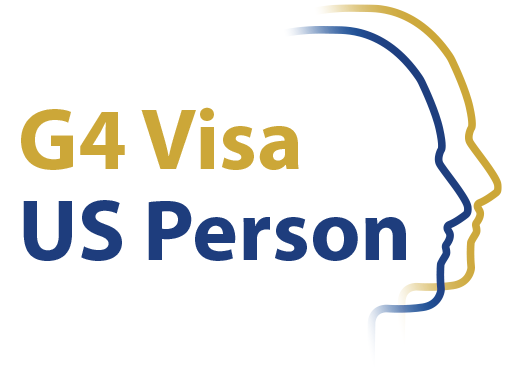G-4 diplomatic visas and US Person status: what's the difference?

G-4 diplomatic visas and US Person status: what's the difference?
FATCA, America's Foreign Account Tax Compliance Act, came into force in 2014, and many individuals, such as international officials who may be internationally highly mobile, may find themselves affected by the status of “US Person for tax purposes“.
Are international officials concerned?
Being treated as a US Person may be a cause for concern, particularly for international officials and employees who risk being posted or sent on mission to an Intergovernmental organisation present on the territory of the USA.
If you are an international official or employed by an Intergovernmental organisation and you hold a G-4 diplomatic visa, you are not affected by the US Person rules. Furthermore, members of your immediate family may be awarded a G-7 visa. With these visas you will not be treated as US residents for tax purposes, and not considered to be US Persons.
How financial institutions are required to deal with US Persons
FATCA requires banks and financial institutions to report to the Internal Revenue Service (IRS) the assets of any client showing indicia of US Person status as defined by the IRS.
This legislation applies to US citizens (by birth, descent or naturalisation), holders of Green cards, and all tax residents present on US territory.[1] Being treated as a US Person may entail numerous problems arising from complex legislation and procedures. These problems have led a large number of banks and financial institutions to freeze the assets of US Persons, close their accounts and decline their custom.
AMFIE's services for G-4 Visa holders and US Persons
International officials and employees of intergovernmental organisations present on US territory who hold a G-4 visa have access to the full range of AMFIE's financial products and services. Members of their family holding a G-7 visa may subscribe to those AMFIE services, including but not limited to the multi-currency current account, AMFund investment plan and PEP provident savings plan.
For US Persons, AMFIE has decided to maintain some services including the multi-currency savings account, AMFIE FLEXIBLE term deposits, 0-18 savings account and credit card.
But the AMFund investment plan and PEP provident savings plan, external investment account and AMFIE ordinary shares are not for the moment available to US Persons. Full details of AMFIE services available to visa-holders and US Persons can be found on the AMFIE website.
